IN the wake of fierce fighting, the Allies were now in control of the west bank of the River Maas, with the enemy on the east bank. Following its relief, the battalion received reinforcements to bring it back up to full strength after the grievous casualties suffered at the end of November. Some seven officers and over 100 other ranks were integrated into the battalion during the days of training in reserve.
Once again, the 3rd Mons moved forward, this time to relieve sister battalion, the 2nd Mons, still part of the 53rd Welsh Division; to take up a position to the south of Roermond. With a front of some 4000 yards, facing the River Maas, the battalion had a clear observation position, but were, of course, very thin on the ground being spread out over such a wide front.
There was considerable patrol activity, and the men were on the alert, day and night the whole time. One patrol got split up in the dark and two men killed. Four of the enemy were found in a house in Heel, and were identified as from No. 6 Company, 11th Battalion Hubner Regiment. A civilian was brought in by "A" Company, as a suspected enemy agent, a suspicion which later proved to be correct.
Front line sentries listened across the river to the sounds of the German army enjoying their Christmas Day. The British celebrations were on Boxing Day, when each man received an orange, a packet of boiled sweets, two cans of beer, and some cigarettes to compliment the traditional Christmas Dinner which was brought up after darkness had fallen.
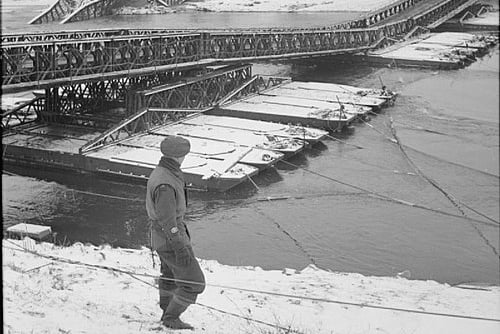
Patrol activity, under cold wet conditions, continued right through to the end of the month. Casualties were light this month, one sergeant and four private soldiers being killed.
There were no New Year's Eve celebrations: just quiet thoughts and hopes that the war would soon be won. Many of the men had been in khaki for over five years, and it was now six months since they had last been home. Finally the battalion was relieved by the 2nd Kings Shropshire Light Infantry, having spent three weeks in occupation of front line positions, out in the open, in temperatures as low as 10 degrees F, when the enemy had been particularly active day and night crossing the river with many patrols.
Relief truly was, relief, and the battalion moved out in a snowstorm, some three miles west, to the village of Baexham, where it remained for the next six weeks. The opportunity to have a full nights sleep, to clean up, and to have a roof overhead, was paradise and the luxury of 48 hour passes to Brussels were enjoyed by many men during this short period of rest, when the snow lay thick on the ground. Initially the reaction of the people of Baexham was unfriendly, but the lads soon changed this, and social evenings and dances were arranged. Training continued and joint exercises were carried out with the 4th Tank Brigade. Amazingly, not one single man was killed in action during January.
In mid-February the battalion moved right back to Belgium, where for the first time since landing in Normandy, the officers were able to enjoy the luxury of dining together in 'The Officers Mess'. To be out of sight and sound of battle, and in the comfort of civilian digs was indeed luxury.
Allied Forces had started clearing the densely wooded Reichswald Forest, and after heavy fighting in extremely bad weather conditions had battled their way forward. The battalion received orders with other units of 11th Armoured Division to move up to the front lines, for an attack towards Wesel on the River Rhine. Multi-rocket firing tanks, and massive artillery barrages supported the attack.
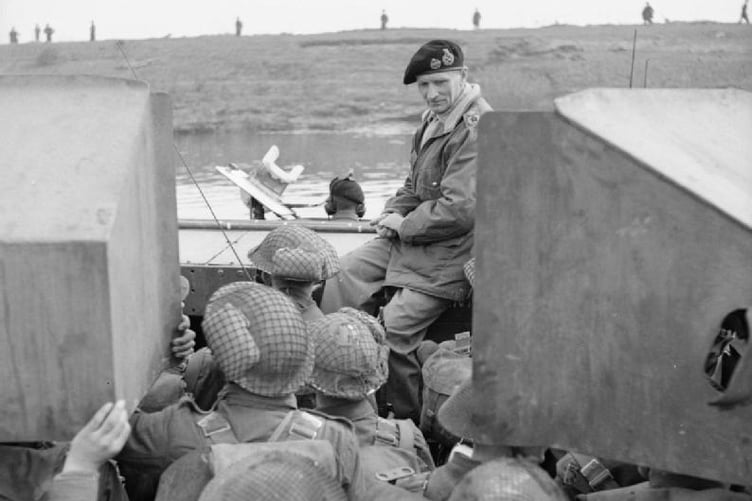
Canadian units took the brunt of the first attack, and the battalion, supported by the tanks of the 23rd Hussars, passed through the Canadian lines. But for some hours, confusion reigned as orders and counter orders were received, and it was finally, in the darkness that the battalion moved further forward. "A" Company came under heavy mortar and machine gun fire, but pushed forward across a 20ft wide stream, followed by "D" Company. At dawn, artillery fire increased, and obviously from its accuracy the battalion position was under observation.
The men were exhausted after a very difficult night, wet through and very hungry. But they held their ground, and later the engineers came forward to bridge the stream - calling it Mons Bridge. The battalion remained in this position for some days - well dug-in. The Herefords, supported by tanks of the 15/19 Kings Royal Hussars, passed through the battalion line and advanced a mile to the German line known as the Schieffen Line. Later "D" Company of 3rd Mons went forward to form a bridgehead over the anti-tank ditch in front of this defence line.
Little opposition was encountered in this action, and during the night, eight Germans walked into their position and surrendered. They said that most of their comrades had withdrawn, and left them behind to fight to the last round and last man, but they didn't think much of that, so surrendered. More prisoners came in at first light, and others were winkled out of farm buildings and outhouses, offering no resistance. February ended with a Company Sgt Major, a sergeant and eight privates killed in action.
Pushing on, "D" Company took more prisoners, but then came under accurate machine gun fire, and withdrew with some difficulty. A troop of Canadian armoured cars arrived, and though warned clearly of the opposition, insisted on pressing forward with disastrous results. The remainder of the battalion now joined "D" Company. "A" and "C" Companies launched a joint attack, but failed to dislodge the enemy.
In late afternoon, "B" Company made another attack, this time supported by tanks and artillery, and under cover of a smoke screen, but again came under concentrated enemy fire. The tanks became bogged down, and "B" Company suffered many casualties, including the Company Commander who was wounded, and later awarded the Military Cross. Although the enemy retreated under cover of darkness they had given a good account of themselves.
The fighting in March, between the Rhine and the Maas will be best remembered by the dull and soul-destroying conditions, and the static situation. There were no sudden and exciting advances with cheering villagers at the roadsides, just slow steady slogging in mud and rain against well prepared defences, held by Germans who were now defending their Fatherland stubbornly. Advances were counted in yards not miles,
Suddenly, orders were received to move right out of the line, back to Belgium. The Division was to be equipped with the new Comet Tanks, and train thoroughly for the expected push into the heart of Germany. This period out of battle was enjoyed by all, with frequent visits to the great city of Brussels, and the fabulous hospitality of its people. Every day out of the line was a bonus, but, as expected, the day arrived with new orders to proceed to battle. On the 26th March, thousands of aircraft towing gliders passed overhead on their way to the Rhine to spearhead the crossing of this great river. At dusk on the 27th March, the battalion crossed the Rhine by pontoon bridge.
Once across the Rhine, the advance was rapid, as the bridgehead was already seven miles deep and ten miles wide. "Steeplechase" was the rather appropriate name given to the route, and a number of villages were leap frogged without incident, white sheets of surrender hanging from every window. There were only isolated pockets of enemy resistance, but these were always excellent defensive positions, and stubbornly defended. Although suffering no casualties in the advance, the infantrymen riding on the backs of the tanks had a most uncomfortable time when enemy planes strafed and dive-bombed the bridge over the Dortmund/Ems Canal.
On the 2nd April, the battalion was ordered to clear the Teutoberger Forest, where enemy resistance was still active. The forest was to be cleared from West to East, a distance of about two miles over steep and densely wooded country, and with precious little knowledge of the enemy positions.
Because of the density of the undergrowth and the difficulty of the terrain, it was to be a pure infantry attack by four Companies, without the support of tanks. "A" Company led the advance, the first objective being a peak about 500ft high, and 1000yds into the forest. Enemy resistance was sudden and sustained: confused fighting ensued, and poor radio contact in the heavily wooded area added to the confusion.
The enemy 'hit and run' tactics were exasperating in the confined area, and contact between Companies could only be maintained by shouting to each other. "C" Company Commander, Major P. Taylor was killed by a snipers bullet, and the 2nd in Command was shot in the neck. The objective was reached, but a sudden counter-attack by the enemy, coming from positions dug deep into the sides of a quarry, forced the leading men to fall back leaving many wounded behind. A wounded private who had been taken prisoner came back into his Company position with a message from the German Commander asking for a temporary truce to collect the many wounded of both sides, and this was agreed. This work went on until darkness fell.
It was now clear who the opposition were - they were excellent soldiers - Cadet Officers from a Training School in Hanover. Heavier support fire from mortars and artillery were called up, but despite the concentration of their accurate fire, its effectiveness could not be ascertained. Nightfall brought heavy rain, with the men wet through and cold lying in the shallow slits they had managed to scoop out of the ground.
With its ranks sadly depleted, and opposing a vastly superior force of first class soldiery, it became clear that the battalion could not accomplish its task. The enemy, encouraged by the success of its defensive action, put in an attack on Battalion Headquarters in an attempt to reach the bridge over the Dortmund/Ems Canal, and blow it up, but this was repelled largely because the enemy was not prepared to take on the Battalion Commander's small 'Honey' Tank our lone piece of armour. While it was known that we still had men on the hill top, there was no means of communicating with them.
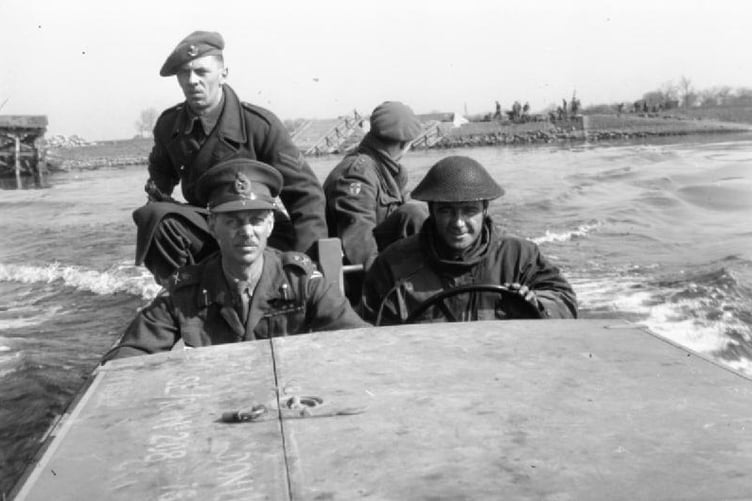
The next day, a fresh battalion of the Dorset Regiment put in an attack supported by heavy artillery, and this, coupled with the resisting 3rd Mons on the hill-top, confused the enemy, as they were already suffering casualties in trying to dislodge the men on the hill-top, and now faced with having to fight on a 'second' front, were forced to withdraw to new positions. Whilst the men of the 3rd Mons suffered a bitter disappointment at failing in their task, they were far from disgraced. It took a full Brigade of Infantry from the 7th Armoured Division, three days to finally clear the forest, suffering many casualties.
The battalion had taken well over 100 prisoners in this action against highly trained and dedicated German soldiers. Corporal E.T. Chapman was awarded the Victoria Cross for his gallantry in this action.
The rest of the 11th Armoured Division had continued its advance into Germany, leaving the depleted and exhausted 3rd Mons too far behind for them to take in and train reinforcements and to catch up again, and their place in the Division was taken by 1st Battalion, The Cheshire Regiment. After all that intensive fighting the men should have been relieved to be left behind, out of the action, safe in the rear, but they felt bitter at being out of the Division which had achieved a proud record in all its actions. The Brigade Commander was begged to allow the battalion to continue, but it was not to be. (Although after the war the Brigade Commander said that he had wished he had had even a half-strength 3rd Mons with him in what turned out to be the final month of the campaign.
The battalion was withdrawn to Wesel on the Rhine, and 115 Independent Brigade, spending their time guarding Rhine bridges, and helping in the supervision of the camps containing tens of thousands of 'Displaced Persons' - Russians, Poles, Italians, Belgians, French - and others in the area. In April, the battalion suffered three officers, one sergeant and 37 other ranks killed, and something like 80/100 wounded.
The fighting was now over for the 3rd Battalion, The Monmouthshire Regiment.
In 11 months of action, the battalion suffered a total loss of 67 officers and 1,089 other ranks killed, wounded, prisoner or missing. Of the 37 officers who had started. out in Normandy, only five remained to the end. Of 72 members of the Sergeants Mess who started in June, only 18 remained when the Mess was reopened, and of those 18, six had been slightly wounded at some time and returned to the action. C.S.M. Horace Amos (later R.S.M.) had been wounded twice, and returned to see the end.
While waiting for demob, the battalion fell into the monotonous routine tasks of guards, and administration, for the remaining months in Germany. Leave to the U.K., was in full swing, and frequent passes to Brussels were a welcome relief; and some even managed 72 hours in Paris. Demobilisation started. Each man received a de-mob number, based on age and length of service. Few were in single figures, but R.S.M. 'Bill' Davies was one of these, and first of the Battalion to go home, to the envy of all others. As the numbers went up, so did the bodies involved, and the excitement grew. When Group 25 went, the Battalion lost a large number of men, and when Group 26 departed it saw the battalion disintegrate; and on the 6th February it was placed in “Suspended Animation”.
After the war it became the 657 Heavy A.A Regiment (3rd Mons) Royal Artillery (T.A.), then 638 Light Anti-Aircraft Regiment, Royal Artillery which was disbanded on re-organisation of the TA and the Battalion Colours laid up in Brecon Cathedral.
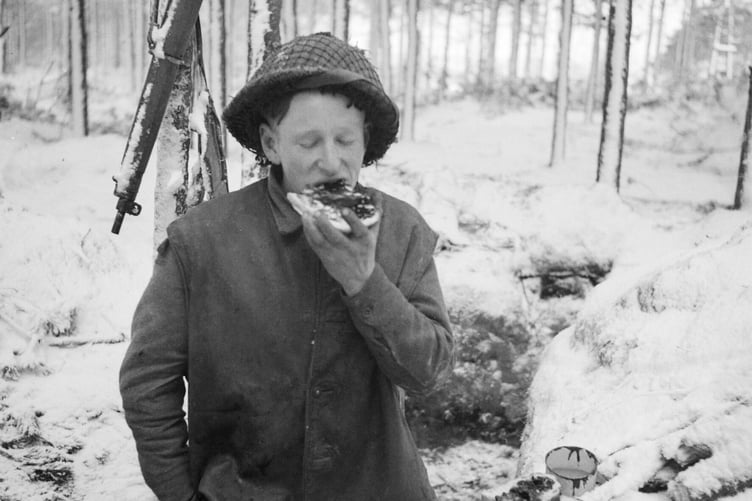

.jpeg?width=209&height=140&crop=209:145,smart&quality=75)
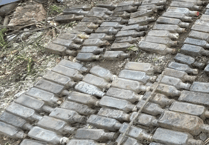

Comments
This article has no comments yet. Be the first to leave a comment.